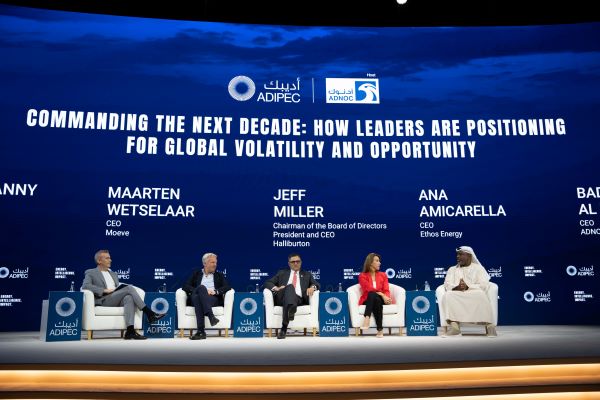ADIPEC 2025 reaffirmed its position as a vital catalyst for strategic partnerships

ADIPEC 2025 has given a powerful call to action for global financiers, policymakers, and energy leaders to accelerate investment in energy and infrastructure. Against a backdrop of high-level discussions and collaboration, the day’s sessions underscored the urgent need for scalable, long-term capital deployment to meet growing global energy demand.
With global energy investment projected to exceed US$3.3 trillion this year, ADIPEC 2025 reaffirmed its position as a vital catalyst for strategic partnerships, financial innovation, and technology-driven solutions across the energy value chain. Taking place from 3–6 November in Abu Dhabi, the event is bringing together finance leaders, policymakers, and industry decision-makers to unlock the capital, tools, and frameworks needed to transform global energy systems with speed and scale.
As energy security and affordability continue to shape global investment strategies, discussions at the Finance & Investment Programme highlighted challenges faced by emerging economies—ranging from high borrowing costs and investment risks to regulatory uncertainty and limited access to creditworthy off-takers. Delegates explored how evolving portfolios, redirected capital flows, and inclusive financing models can strengthen competitiveness, resilience, and long-term decarbonisation.
During a session titled “Commanding the Next Decade: How Leaders Are Positioning for Global Volatility and Opportunity,” Maarten Wetselaar, CEO of Moeve, emphasised the importance of fundamentals-based decision-making. “You always have to invest based on fundamentals rather than the latest policy change, wherever it may come from,” he said. “Energy investments take years to build, and reacting to short-term shifts can be risky.”
The conversation extended to the importance of financing innovation and decarbonisation. In the session “Methane Emissions Reduction: A Decarbonisation Priority,” Zubin Bamji, Manager, Energy and Extractives Global Department, The World Bank Group, addressed the financing gap in methane reduction efforts. “Finance is one of the key missing elements in this ecosystem. The World Bank aims to provide catalytic funding for developing countries and emerging economies to recognise and seize the opportunities in methane and flaring decarbonisation,” he stated.
Echoing this sentiment, Khalid Bin Hadi, Managing Director, UAE, Siemens Energy, stressed the link between innovation and investment: “Innovation is about solving problems. To advance decarbonisation, we must scale innovations through investment, industry partnerships, and true collaboration.”
Emerging markets were also identified as major frontiers for energy and infrastructure investment. In the session “Strengthening Nigeria and NNPC’s Position in Global Energy Markets,” Bayo Bashir Ojulari, Group CEO of NNPC, discussed the nation’s strategic approach to growth. “With production comes the requirement for investment. We are focused on strengthening existing partnerships and exploring new collaborations to unlock future opportunities,” he said.
Speakers throughout the day reaffirmed that sound, stable, and clear policy frameworks are crucial to attracting and unlocking sustainable finance. Charlotte Wolff-Bye, Chief Sustainability Officer, PETRONAS, summarised the sentiment succinctly: “Business works best when there is a clear line of sight in regulation and policy. Investment will flow where frameworks are consistent and enforceable.”
Subscribe to our newsletter & stay updated.